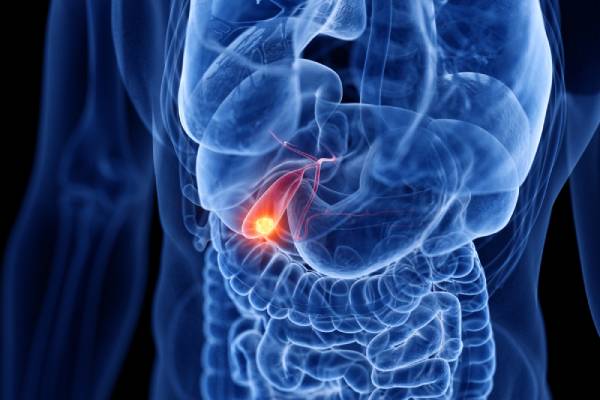Gallbladder cancer is a rare but serious condition that requires expert diagnosis and advanced treatment. Dr. M.S.S. Keerthi, a renowned Surgical Oncologist in Hyderabad, brings over 15 years of expertise in performing complex cancer surgeries. She has successfully treated thousands of patients with various cancers, including gallbladder cancer, offering hope and healing to those in need.
As the Best Cancer Specialist in Hyderabad, Dr. Keerthi specializes in minimally invasive surgical techniques, such as laparoscopic and robotic surgery, ensuring precision and faster recovery for her patients. Currently practicing as a Senior Consultant Surgical Oncologist at Tulasi Hospital in Secunderabad, Dr. Keerthi provides compassionate and personalized care to every patient she serves.
What is Gallbladder cancer
Gallbladder cancer, also known as cholangiocarcinoma, is a rare and aggressive form of cancer that originates in the gallbladder. The gallbladder is a small, pear-shaped organ located beneath the liver, and its primary function is to store and concentrate bile, a digestive fluid produced by the liver. Bile is released into the small intestine to help with the digestion of fats. Gallbladder cancer can be challenging to detect at an early stage, often leading to a poor prognosis.

Causes of Gallbladder Cancer:
- Gallstones: One of the most significant risk factors for gallbladder cancer is the presence of gallstones. Gallstones are solid particles that form in the gallbladder due to the crystallization of cholesterol or bilirubin. Over time, the chronic irritation caused by gallstones can increase the risk of cancer.
- Chronic Inflammation of the Gallbladder: Ongoing inflammation of the gallbladder, often as a result of conditions like chronic cholecystitis, can lead to changes in the gallbladder lining and an increased risk of cancer.
- Family History: A family history of cancer can raise an individual’s risk. This suggests a possible genetic predisposition to the disease.
- Obesity: Obesity is another risk factor for gallbladder cancer. The exact mechanisms linking obesity to the disease are not entirely clear, but it is thought to be related to increased inflammation and changes in hormone levels.
- Certain Genetic Conditions: Some hereditary conditions, such as Lynch syndrome and polycystic liver disease, can increase the risk of gallbladder cancer.
Symptoms
The symptoms of gallbladder cancer may not become evident until the disease is in advanced stages. Common symptoms include:
- Abdominal Pain: Patients often experience abdominal pain, especially in the upper right side, which can be persistent and severe.
- Jaundice: Jaundice occurs when the cancer blocks the bile ducts, leading to a yellowing of the skin and eyes.
- Unexplained Weight Loss: Significant and unintended weight loss is a common symptom of many cancers, including gallbladder cancer.
- Nausea and Vomiting: As the disease progresses, individuals may experience nausea and vomiting.
Diagnosis and Treatment:
Diagnosing gallbladder cancer typically involves a combination of imaging tests and biopsies:
- Imaging Tests: Various imaging techniques such as ultrasound, CT scans, MRI scans, and PET scans are used to visualize the gallbladder and surrounding structures. These can help identify tumors and assess the extent of the disease.
- Biopsies: A biopsy involves removing a small sample of tissue for examination under a microscope to confirm the presence of cancer.
Treatment Options for Gallbladder Cancer:
The treatment approach for gallbladder cancer depends on the stage of the disease and the patient’s overall health. Common treatment options include:
- Surgical Removal of the Gallbladder (Cholecystectomy): Surgery to remove the gallbladder is the primary treatment for early-stage gallbladder cancer. In some cases, nearby lymph nodes and a portion of the liver may also be removed.
- Chemotherapy: Chemotherapy is often used before or after surgery to target cancer cells throughout the body. It can also be used to manage advanced stages of the disease.
- Radiation Therapy: Radiation therapy may be employed to target and shrink tumors, particularly when they cannot be surgically removed.
- Targeted Therapy and Immunotherapy: In some cases, targeted therapy and immunotherapy drugs may be used to specifically target cancer cells or boost the immune system’s response.
Gallbladder cancer requires early detection and specialized treatment to achieve the best outcomes. Dr. Keerthi’s commitment to providing world-class cancer care in Hyderabad makes her the ideal choice for patients seeking a reliable partner in their journey to recovery. If you or someone you know is facing gallbladder cancer, take the first step towards healing by consulting Dr. M.S.S. Keerthi—widely regarded as the Best Cancer Specialist in Hyderabad.
Frequently Asked Questions (FAQ's):
Gallbladder cancer can be difficult to prevent completely, but managing known risk factors such as gallstones, obesity, and chronic inflammation of the gallbladder can help reduce the risk. Regular medical check-ups and early detection can also improve outcomes.
The gallbladder plays a crucial role in digestion by storing and concentrating bile, which is released into the small intestine to help digest fats. Bile emulsifies fats, making them easier to digest and absorb.
Survival rates for gallbladder cancer depend on the stage at which the cancer is diagnosed. Unfortunately, many cases are not discovered until they have reached an advanced stage, leading to lower survival rates. However, early-stage gallbladder cancer may have a more favorable prognosis. It’s essential to consult with a healthcare professional for personalized information on prognosis and treatment options.
